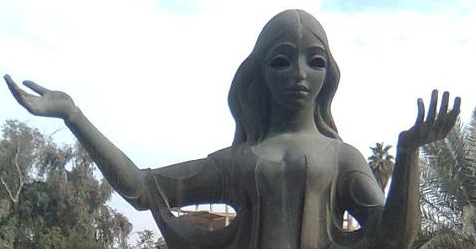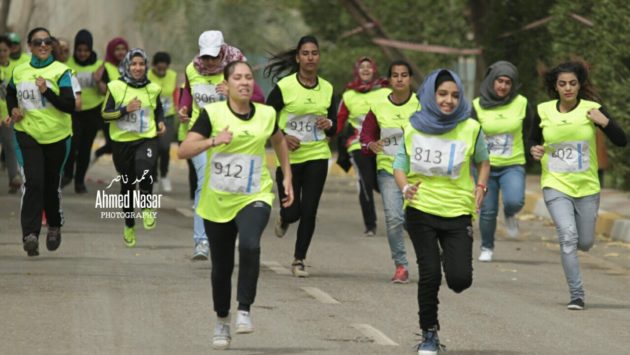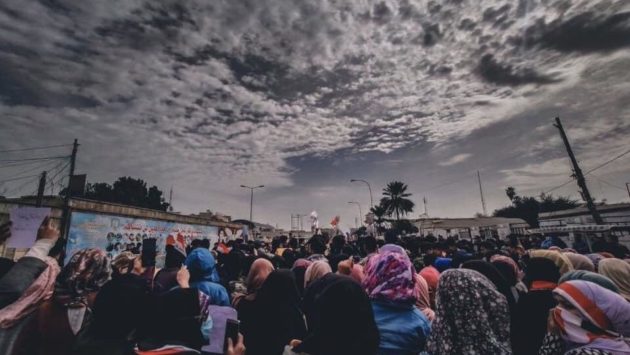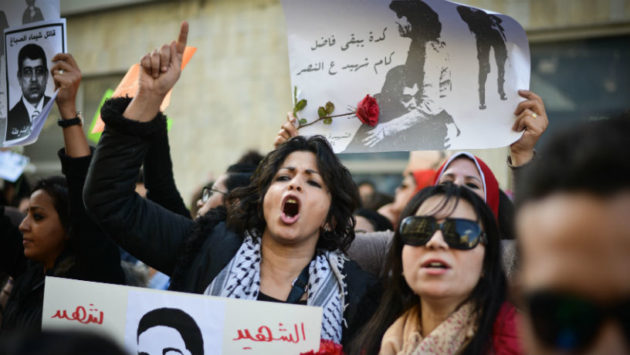Will the “Shahrazad” Campaign Succeed in Mobilizing Public Opinion Against Underage Marriage and Sexual Harassment in Iraq?
The Iraqi Civil Society Solidarity Initiative
February 2015
Efforts to build the “Shahrazad Campaign” began in April 2014, but this civil campaign will fully develop this year. The mobilization for “Shahrazad” was launched in direct response to the so-called “Al-Jaafari Personal Status draft law” approved by the Iraqi Council of Ministers during Al-Maliki regime. This draft law sought to legalize marriage of girls as young as 9 years old, to legalize marital rape, and to grant clerics wide powers to act in violation of the Civil Code of Iraq in an attempt to impose a grossly distorted version of “Sharia” law on Iraqi society. Since its inception, the campaign has focused on sexual harassment for two reasons: first, as a response to the rise of this phenomenon in Iraqi society; and second, because of the widespread unwillingness to confront the reality of sexual harassment directly — some avoid talking about it under the pretext that tradition does not allow discussion on this sensitive subject.
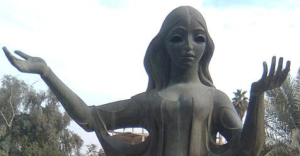 During its short life, the campaign succeeded in the preparation of important documents, starting with the booklet “Opposing Al-Jaafari personal status draft law on legal basis”, which was printed and distributed widely in Erbil and disseminated more narrowly in Baghdad. Articles have been written as “Why we demand the cancellation of Article 41 of the Iraqi constitution”.
During its short life, the campaign succeeded in the preparation of important documents, starting with the booklet “Opposing Al-Jaafari personal status draft law on legal basis”, which was printed and distributed widely in Erbil and disseminated more narrowly in Baghdad. Articles have been written as “Why we demand the cancellation of Article 41 of the Iraqi constitution”.
In terms of coordination and networking, in 2014 there was significant collaboration between Iraqi and international organizations who, through coordinated petitioning, collected signatures to oppose the Al-Jaafari law. For example, the petition of the International Walk Free Organization collected more than half a million of signatures, and the Women Found Organization together with the ‘civilized dialogue’ website collected more than 13000 signatures with help from many Iraqi organizations. The text of the petition posted on the ‘civilized dialogue’ website (click here) is the result of the combined efforts of many groups working together to oppose this discriminatory law.
The Shahrazad campaign seeks to publish news and articles related to the themes of the campaign in English, as well as in Arabic. It is also particularly interested in social media: it has a Facebook page on behalf of Shahrazad, and it uses #Shahrazad Hash-tag on Twitter.
Campaign Activities and Priorities for 2015
“Shahrazad” continues to try to mobilize Iraqi civil society organizations and the international community under one broad goal, which is to defend the freedom of Iraqi woman in the face those forces that seek to discriminate against them under the false pretense of upholding religions and traditional beliefs and values.
The Iraqi Civil Society Solidarity Initiative, in partnership with a number of Iraqi organizations, seeks to develop an action plan for 2015 to structure and invigorate the campaign. Below is the outline of their future activities and the partners involved in the campaign:
– Al-Mesalla Centre: This Iraqi NGO based in Erbil played an important role in the campaign in Iraq and Kurdistan. Activities planned for 2015 range from trainings for activists of the campaign, a scientific study on the phenomenon of harassment in Kurdistan, an academic seminar dedicated to the campaign, and advocacy meetings in Kurdistan. Finally, a public ‘Shahrazad’ Festival will be held in Erbil. Al-Masalla organization also plans to produce interactive materials about the campaign, using social media and videos.
– Iraqi Women Journalists Forum: This Baghdad-based Forum worked on key activities within the campaign. This year it will produce of a scientific study on the phenomenon of sexual harassment, and a video to educate people about sexual harassment and effective ways to address it. The forum plans to conduct academic and legal seminars in Baghdad, followed by a number of advocacy meetings to publicize the seminar’s results. The forum will be involved in an initial training for campaign activists to be organized by Almasalla Organization in Erbil.
– The Iraqi Social Forum: The Secretariat of the ISF works to involve young volunteers in support of the campaign, and will organize a youth camp for the Shahrazd activists. Its member organizations will work to produce identifiable and interactive materials to support and revitalize the campaign, especially through social media. The ISF Committee will organize a public festival for the campaign in cooperation with the Iraqi Women Journalists Forum.
Challenges Facing the Campaign:
– Daaesh and Violence against Women
Since June 2014, the extremist organization of Daaesh (former ISIS) seized direct control of cities and wide regions of Iraq. Their arrival effectively changed reality for thousands of people, making day-to-day life characterized by constant terror and fear. The campaign must not neglect this new reality and its repercussions. Protecting women from the very real risk of displacement, murder and slavery places them at the top of the campaign’s priorities. Daaesh represents a form of extremism that threatens women in particular, but it also poses a major threat to Iraqi society in general. Underage marriage and violating women’s privacy and autonomy by locking them away in their homes, forcing them to dress from head to toe in black cloth, are only some of the methods Daaesh uses to impose its misogynist and oppressive system on the Iraqi people, always justified by an appeal to ‘religion’. This is what must be confronted and challenged. Iraqi society is accustomed to women moving freely and openly in the streets, being active at school and in the workplace. The campaign faces the challenge of convincing people that civil society, with the help of enlightened forces within Iraq and the international community, can stand up against all those cruel and oppressive assumptions that lead to the isolation and violation of women. This demands challenging those conservative and often repressive traditional and ethnic practices that control parts of Iraqi society, which discourage people from taking action and dealing with the problems women face.
– Underage Marriage
Although Al-Jaafari law has been frozen and is not up for debate currently, the issue remains, and poses a very real threat. For example, underage marriage is practiced in the country, and the legal basis that the Al-Jaafari law was built upon – Article 41 of the Constitution – is still in effect. There are many examples of the Iraqi Personal Status Law being violated today, although it is ostensibly the law in force. Recently, an important meeting between the head of the Iraqi Judicial Council and a group of women’s rights organizations was held; the head of the Federal Judiciary (Judge Medhat Al-Mahmoud) confirmed the need to respect laws, and said that if the traditional marriage registrar permitted underage marriages he would be crossing a red line which would represent a significant infringement on the federal judiciary. In Kurdistan, in a very important step starting the new year on the right foot, the Ministry of Endowments and Religions Affairs of Kurdistan identified the age of marriage as 18 years, and warned violators of legal accountability. However, despite these positive steps, the issue remains, and efforts must continue on the part of civil society to reduce the risk to women, especially since some conservative forces are still defending the marriage of minors. In fact, just within the past few days, an Iraqi cleric demanded the return of Al-Jaafari draft law and condemned the Judicial Council’s comments on the role of the “marriage registrar”. The campaign seeks to change the focus of attention from opposing the Jaafari law to a more direct challenge to underage marriage as long as the law does not risk to be discussed. As it is possible to repeal Article 41 and still maintain a unified civil code for the Iraqis, it seems important to aim at adjusting the code in such a way that it respects women’s rights.
– Harassment
Recognition of harassment has expanded to include harassment of women in the workplace, harassment at check points, and harassment on the roads and in public places. The Iraqi Women Journalists Forum has presented a study on harassment experienced by women journalists, and TV programs such as “Alhawa lak” (presented by Al-Sumariya Channel) have also discussed the issue. The practice of separating boys and girls within their communities is on the rise, and is almost always justified by an appeal to religion and tradition. The Shahrazad campaign wants to highlight the detrimental effects of such policies. They threaten future generations by creating a situation in which a healthy community of men and women, living together as equals, seems unnatural and so cannot exist. Additionally, these policies have been shown to increase harassment and delinquency, as predicted by the Iraqi sociologist Ali Al-Wardi in his book The Personality of the Iraqi Individual (printed in Baghdad in 1951 p. 59). In Kurdistan, the picture is similar and presents a parallel need for a deeper study of the phenomenon and proposals for social and possibly legal solutions.
– The Multiplicity of Organizations and Campaigns
There are few programs that are active on sensitive topics such as underage marriage and sexual harassment; however, there are a number of organizations which have already made some significant contributions over the past few years. Shahrazad campaign is not a substitute for other organizations or events, but rather a complementary process. Given this, organizers of the Shahrazad campaign invite others to take advantage of their proposed activities and to involve the largest possible number of organizations and activists in its events for the purpose of continuing on the journey to the defend Women’s Freedom in Iraq.

